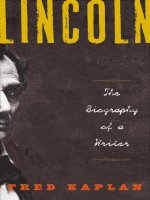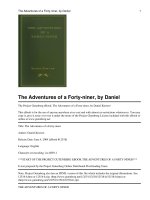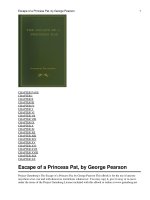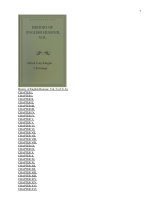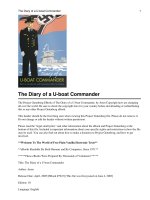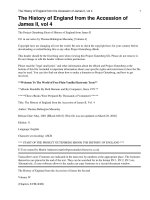The portrait of a lady vol 2
Bạn đang xem bản rút gọn của tài liệu. Xem và tải ngay bản đầy đủ của tài liệu tại đây (1.19 MB, 275 trang )
TheProjectGutenbergEBookofThePortraitofaLady,byHenryJames
ThiseBookisfortheuseofanyoneanywhereatnocostandwith
almostnorestrictionswhatsoever.Youmaycopyit,giveitawayor
re-useitunderthetermsoftheProjectGutenbergLicenseincluded
withthiseBookoronlineatwww.gutenberg.org
Title:ThePortraitofaLady
Volume2(of2)
Author:HenryJames
ReleaseDate:December1,2008[EBook#2834]
LastUpdated:September20,2016
Language:English
***STARTOFTHISPROJECTGUTENBERGEBOOKTHEPORTRAITOFALADY***
ProducedbyEveSobol,andDavidWidger
THEPORTRAITOFALADY
VOLUMEII(ofII)
ByHenryJames
PreviousVolume
CONTENTS
CHAPTERXXVIII
CHAPTERXXIX
CHAPTERXXX
CHAPTERXXXI
CHAPTERXXXII
CHAPTERXXXIII
CHAPTERXXXIV
CHAPTERXXXV
CHAPTERXXXVI
CHAPTERXXXVII
CHAPTERXXXVIII
CHAPTERXXXIX
CHAPTERXL
CHAPTERXLI
CHAPTERXLII
CHAPTERXLIII
CHAPTERXLIV
CHAPTERXLV
CHAPTERXLVI
CHAPTERXLVII
CHAPTERXLVIII
CHAPTERXLIX
CHAPTERL
CHAPTERLI
CHAPTERLII
CHAPTERLIII
CHAPTERLIV
CHAPTERLV
CHAPTERXXVIII
Onthemorrow,intheevening,LordWarburtonwentagaintoseehisfriends
at their hotel, and at this establishment he learned that they had gone to the
opera. He drove to the opera with the idea of paying them a visit in their box
aftertheeasyItalianfashion;andwhenhehadobtainedhisadmittance—itwas
one of the secondary theatres—looked about the large, bare, ill-lighted house.
An act had just terminated and he was at liberty to pursue his quest. After
scanningtwoorthreetiersofboxesheperceivedinoneofthelargestofthese
receptaclesaladywhomheeasilyrecognised.MissArcherwasseatedfacingthe
stageandpartlyscreenedbythecurtainofthebox;andbesideher,leaningback
in his chair, was Mr. Gilbert Osmond. They appeared to have the place to
themselves, and Warburton supposed their companions had taken advantage of
therecesstoenjoytherelativecoolnessofthelobby.Hestoodawhilewithhis
eyesontheinterestingpair;heaskedhimselfifheshouldgoupandinterruptthe
harmony. At last he judged that Isabel had seen him, and this accident
determinedhim.Thereshouldbenomarkedholdingoff.Hetookhiswaytothe
upperregionsandonthestaircasemetRalphTouchettslowlydescending,hishat
attheinclinationofennuiandhishandswheretheyusuallywere.
“Isawyoubelowamomentsinceandwasgoingdowntoyou.Ifeellonely
andwantcompany,”wasRalph’sgreeting.
“You’vesomethat’sverygoodwhichyou’veyetdeserted.”
“Doyoumeanmycousin?Oh,shehasavisitoranddoesn’twantme.Then
Miss Stackpole and Bantling have gone out to a cafe to eat an ice—Miss
Stackpole delights in an ice. I didn’t think they wanted me either. The opera’s
very bad; the women look like laundresses and sing like peacocks. I feel very
low.”
“Youhadbettergohome,”LordWarburtonsaidwithoutaffectation.
“Andleavemyyoungladyinthissadplace?Ahno,Imustwatchoverher.”
“Sheseemstohaveplentyoffriends.”
“Yes, that’s why I must watch,” said Ralph with the same large mockmelancholy.
“Ifshedoesn’twantyouit’sprobableshedoesn’twantme.”
“No,you’redifferent.GototheboxandstaytherewhileIwalkabout.”
LordWarburtonwenttothebox,whereIsabel’swelcomewasastoafriendso
honourablyoldthathevaguelyaskedhimselfwhatqueertemporalprovinceshe
wasannexing.HeexchangedgreetingswithMr.Osmond,towhomhehadbeen
introducedthedaybeforeandwho,afterhecamein,satblandlyapartandsilent,
asifrepudiatingcompetenceinthesubjectsofallusionnowprobable.Itstruck
hersecondvisitorthatMissArcherhad,inoperaticconditions,aradiance,even
aslightexaltation;asshewas,however,atalltimesakeenly-glancing,quicklymoving,completelyanimatedyoungwoman,hemayhavebeenmistakenonthis
point. Her talk with him moreover pointed to presence of mind; it expressed a
kindnesssoingeniousanddeliberateastoindicatethatshewasinundisturbed
possessionofherfaculties.PoorLordWarburtonhadmomentsofbewilderment.
Shehaddiscouragedhim,formally,asmuchasawomancould;whatbusiness
had she then with such arts and such felicities, above all with such tones of
reparation—preparation?Hervoicehadtricksofsweetness,butwhyplaythem
onhim?Theotherscameback;thebare,familiar,trivialoperabeganagain.The
box was large, and there was room for him to remain if he would sit a little
behindandinthedark.Hedidsoforhalfanhour,whileMr.Osmondremained
in front, leaning forward, his elbows on his knees, just behind Isabel. Lord
Warburtonheardnothing,andfromhisgloomycornersawnothingbuttheclear
profile of this young lady defined against the dim illumination of the house.
When there was another interval no one moved. Mr. Osmond talked to Isabel,
and Lord Warburton kept his corner. He did so but for a short time, however;
afterwhichhegotupandbadegood-nighttotheladies.Isabelsaidnothingto
detainhim,butitdidn’tpreventhisbeingpuzzledagain.Whyshouldshemark
sooneofhisvalues—quitethewrongone—whenshewouldhavenothingtodo
with another, which was quite the right? He was angry with himself for being
puzzled,andthenangryforbeingangry.Verdi’smusicdidlittletocomforthim,
andheleftthetheatreandwalkedhomeward,withoutknowinghisway,through
the tortuous, tragic streets of Rome, where heavier sorrows than his had been
carriedunderthestars.
“What’s the character of that gentleman?” Osmond asked of Isabel after he
hadretired.
“Irreproachable—don’tyouseeit?”
“He owns about half England; that’s his character,” Henrietta remarked.
“That’swhattheycallafreecountry!”
“Ah,he’sagreatproprietor?Happyman!”saidGilbertOsmond.
“Do you call that happiness—the ownership of wretched human beings?”
cried Miss Stackpole. “He owns his tenants and has thousands of them. It’s
pleasant to own something, but inanimate objects are enough for me. I don’t
insistonfleshandbloodandmindsandconsciences.”
“It seems to me you own a human being or two,” Mr. Bantling suggested
jocosely.“IwonderifWarburtonordershistenantsaboutasyoudome.”
“Lord Warburton’s a great radical,” Isabel said. “He has very advanced
opinions.”
“He has very advanced stone walls. His park’s enclosed by a gigantic iron
fence,somethirtymilesround,”HenriettaannouncedfortheinformationofMr.
Osmond.“IshouldlikehimtoconversewithafewofourBostonradicals.”
“Don’ttheyapproveofironfences?”askedMr.Bantling.
“Only to shut up wicked conservatives. I always feel as if I were talking to
youoversomethingwithaneattop-finishofbrokenglass.”
“Do you know him well, this unreformed reformer?” Osmond went on,
questioningIsabel.
“WellenoughforalltheuseIhaveforhim.”
“Andhowmuchofauseisthat?”
“Well,Iliketolikehim.”
“‘Likingtolike’—why,itmakesapassion!”saidOsmond.
“No”—sheconsidered—“keepthatforlikingtodislike.”
“Doyouwishtoprovokemethen,”Osmondlaughed,“toapassionforhim?”
She said nothing for a moment, but then met the light question with a
disproportionategravity.“No,Mr.Osmond;Idon’tthink Ishouldeverdareto
provoke you. Lord Warburton, at any rate,” she more easily added, “is a very
niceman.”
“Ofgreatability?”herfriendenquired.
“Ofexcellentability,andasgoodashelooks.”
“Asgoodashe’sgood-lookingdoyoumean?He’sverygood-looking.How
detestablyfortunate!—tobeagreatEnglishmagnate,tobecleverandhandsome
intothebargain,and,bywayoffinishingoff,toenjoyyourhighfavour!That’sa
manIcouldenvy.”
Isabel considered him with interest. “You seem to me to be always envying
someone.YesterdayitwasthePope;to-dayit’spoorLordWarburton.”
“Myenvy’snotdangerous;itwouldn’thurtamouse.Idon’twanttodestroy
thepeople—Ionlywanttobethem.Youseeitwoulddestroyonlymyself.”
“You’dliketobethePope?”saidIsabel.
“Ishouldloveit—butIshouldhavegoneinforitearlier.Butwhy”—Osmond
reverted—“doyouspeakofyourfriendaspoor?”
“Women—when they are very, very good sometimes pity men after they’ve
hurtthem;that’stheirgreatwayofshowingkindness,”saidRalph,joininginthe
conversationforthefirsttimeandwithacynicismsotransparentlyingeniousas
tobevirtuallyinnocent.
“Pray,haveIhurtLordWarburton?”Isabelasked,raisinghereyebrowsasif
theideawereperfectlyfresh.
“Itserveshimrightifyouhave,”saidHenriettawhilethecurtainroseforthe
ballet.
Isabel saw no more of her attributive victim for the next twenty-four hours,
but on the second day after the visit to the opera she encountered him in the
galleryoftheCapitol,wherehestoodbeforethelionofthecollection,thestatue
oftheDyingGladiator.Shehadcomeinwithhercompanions,amongwhom,on
this occasion again, Gilbert Osmond had his place, and the party, having
ascendedthestaircase,enteredthefirstandfinestoftherooms.LordWarburton
addressed her alertly enough, but said in a moment that he was leaving the
gallery.“AndI’mleavingRome,”headded.“Imustbidyougoodbye.”Isabel,
inconsequentlyenough,wasnowsorrytohearit.Thiswasperhapsbecauseshe
hadceasedtobeafraidofhisrenewinghissuit;shewasthinkingofsomething
else. She was on the point of naming her regret, but she checked herself and
simply wished him a happy journey; which made him look at her rather
unlightedly.“I’mafraidyou’llthinkmevery‘volatile.’ItoldyoutheotherdayI
wantedsomuchtostop.”
“Ohno;youcouldeasilychangeyourmind.”
“That’swhatIhavedone.”
“Bonvoyagethen.”
“You’reinagreathurrytogetridofme,”saidhislordshipquitedismally.
“Notintheleast.ButIhatepartings.”
“Youdon’tcarewhatIdo,”hewentonpitifully.
Isabel looked at him a moment. “Ah,” she said, “you’re not keeping your
promise!”
He coloured like a boy of fifteen. “If I’m not, then it’s because I can’t; and
that’swhyI’mgoing.”
“Good-byethen.”
“Good-bye.”Helingeredstill,however.“WhenshallIseeyouagain?”
Isabel hesitated, but soon, as if she had had a happy inspiration: “Some day
afteryou’remarried.”
“Thatwillneverbe.Itwillbeafteryouare.”
“Thatwilldoaswell,”shesmiled.
“Yes,quiteaswell.Good-bye.”
They shook hands, and he left her alone in the glorious room, among the
shining antique marbles. She sat down in the centre of the circle of these
presences, regarding them vaguely, resting her eyes on their beautiful blank
faces;listening,asitwere,totheireternalsilence.Itisimpossible,inRomeat
least, to look long at a great company of Greek sculptures without feeling the
effect of their noble quietude; which, as with a high door closed for the
ceremony, slowly drops on the spirit the large white mantle of peace. I say in
Rome especially, because the Roman air is an exquisite medium for such
impressions. The golden sunshine mingles with them, the deep stillness of the
past,sovividyet,thoughitisnothingbutavoidfullofnames,seemstothrowa
solemn spell upon them. The blinds were partly closed in the windows of the
Capitol, and a clear, warm shadow rested on the figures and made them more
mildlyhuman.Isabelsattherealongtime,underthecharmoftheirmotionless
grace,wonderingtowhat,oftheirexperience,theirabsenteyeswereopen,and
how, to our ears, their alien lips would sound. The dark red walls of the room
threwthemintorelief;thepolishedmarblefloorreflectedtheirbeauty.Shehad
seenthemallbefore,butherenjoymentrepeateditself,anditwasallthegreater
because she was glad again, for the time, to be alone. At last, however, her
attentionlapsed,drawnoffbyadeepertideoflife.Anoccasionaltouristcame
in,stoppedandstaredamomentattheDyingGladiator,andthenpassedoutof
theotherdoor,creakingoverthesmoothpavement.Attheendofhalfanhour
Gilbert Osmond reappeared, apparently in advance of his companions. He
strolledtowardher slowly,withhishandsbehindhimandhisusualenquiring,
yetnotquiteappealingsmile.“I’msurprisedtofindyoualone,Ithoughtyouhad
company.
“SoIhave—thebest.”AndsheglancedattheAntinousandtheFaun.
“DoyoucallthembettercompanythananEnglishpeer?”
“Ah, my English peer left me some time ago.” She got up, speaking with
intentionalittledryly.
Mr. Osmond noted her dryness, which contributed for him to the interest of
hisquestion.“I’mafraidthatwhatIheardtheothereveningistrue:you’rerather
crueltothatnobleman.”
Isabel looked a moment at the vanquished Gladiator. “It’s not true. I’m
scrupulouslykind.”
“That’sexactlywhatImean!”GilbertOsmondreturned,andwithsuchhappy
hilarity that his joke needs to be explained. We know that he was fond of
originals,ofrarities,ofthesuperiorandtheexquisite;andnowthathehadseen
LordWarburton,whomhethoughtaveryfineexampleofhisraceandorder,he
perceivedanewattractionintheideaoftakingtohimselfayoungladywhohad
qualified herself to figure in his collection of choice objects by declining so
noble a hand. Gilbert Osmond had a high appreciation of this particular
patriciate;notsomuchforitsdistinction,whichhethoughteasilysurpassable,as
foritssolidactuality.Hehadneverforgivenhisstarfornotappointinghimtoan
Englishdukedom,andhecouldmeasuretheunexpectednessofsuchconductas
Isabel’s. It would be proper that the woman he might marry should have done
somethingofthatsort.
CHAPTERXXIX
Ralph Touchett, in talk with his excellent friend, had rather markedly
qualified,asweknow,hisrecognitionofGilbertOsmond’spersonalmerits;but
hemightreallyhavefelthimselfilliberalinthelightofthatgentleman’sconduct
during the rest of the visit to Rome. Osmond spent a portion of each day with
Isabelandhercompanions,andendedbyaffectingthemastheeasiestofmento
livewith.Whowouldn’thaveseenthathecouldcommand,asitwere,bothtact
andgaiety?—whichperhapswasexactlywhyRalphhadmadehisold-timelook
ofsuperficialsociabilityareproachtohim.EvenIsabel’sinvidiouskinsmanwas
obliged to admit that he was just now a delightful associate. His good humour
was imperturbable, his knowledge of the right fact, his production of the right
word,asconvenientasthefriendlyflickerofamatchforyourcigarette.Clearly
hewasamused—asamusedasamancouldbewhowassolittleeversurprised,
andthatmadehimalmostapplausive.Itwasnotthathisspiritswerevisiblyhigh
—hewouldnever,intheconcertofpleasure,touchthebigdrumbysomuchasa
knuckle: he had a mortal dislike to the high, ragged note, to what he called
random ravings. He thought Miss Archer sometimes of too precipitate a
readiness.Itwaspityshehadthatfault,becauseifshehadnothaditshewould
reallyhavehadnone;shewouldhavebeenassmoothtohisgeneralneedofher
as handled ivory to the palm. If he was not personally loud, however, he was
deep,andduringtheseclosingdaysoftheRomanMayheknewacomplacency
that matched with slow irregular walks under the pines of the Villa Borghese,
amongthesmallsweetmeadow-flowersandthemossymarbles.Hewaspleased
witheverything;hehadneverbeforebeenpleasedwithsomanythingsatonce.
Oldimpressions,oldenjoyments,renewedthemselves;oneevening,goinghome
tohisroomattheinn,hewrotedownalittlesonnettowhichheprefixedthetitle
of “Rome Revisited.” A day or two later he showed this piece of correct and
ingenious verse to Isabel, explaining to her that it was an Italian fashion to
commemoratetheoccasionsoflifebyatributetothemuse.
He took his pleasures in general singly; he was too often—he would have
admitted that—too sorely aware of something wrong, something ugly; the
fertilisingdewofaconceivablefelicitytooseldomdescendedonhisspirit.But
atpresenthewashappy—happierthanhehadperhapseverbeeninhislife,and
the feeling had a large foundation. This was simply the sense of success—the
mostagreeableemotionofthehumanheart.Osmondhadneverhadtoomuchof
it;inthisrespecthehadtheirritationofsatiety,asheknewperfectlywelland
often reminded himself. “Ah no, I’ve not been spoiled; certainly I’ve not been
spoiled,” he used inwardly to repeat. “If I do succeed before I die I shall
thoroughlyhaveearnedit.” Hewastooapttoreasonasif“earning”this boon
consisted above all of covertly aching for it and might be confined to that
exercise. Absolutely void of it, also, his career had not been; he might indeed
havesuggestedtoaspectatorhereandtherethathewasrestingonvaguelaurels.
Buthistriumphswere,someofthem,nowtooold;othershadbeentooeasy.The
presentonehadbeenlessarduousthanmighthavebeenexpected,buthadbeen
easy—that is had been rapid—only because he had made an altogether
exceptionaleffort,agreatereffortthanhehadbelieveditinhimtomake.The
desiretohavesomethingorothertoshowforhis“parts”—toshowsomehowor
other—hadbeenthedreamofhisyouth;butastheyearswentontheconditions
attachedtoanymarkedproofofrarityhadaffectedhimmoreandmoreasgross
anddetestable;liketheswallowingofmugsofbeertoadvertisewhatonecould
“stand.” If an anonymous drawing on a museum wall had been conscious and
watchfulitmighthaveknownthispeculiarpleasureofbeingatlastandallofa
sudden identified—as from the hand of a great master—by the so high and so
unnoticedfactofstyle.His“style”waswhatthegirlhaddiscoveredwithalittle
help; and now, beside herself enjoying it, she should publish it to the world
withouthishavinganyofthetrouble.Sheshoulddothethingforhim, andhe
wouldnothavewaitedinvain.
Shortly before the time fixed in advance for her departure this young lady
receivedfromMrs.Touchettatelegramrunningasfollows:“LeaveFlorence4th
JuneforBellaggio,andtakeyouifyouhavenototherviews.Butcan’twaitif
youdawdleinRome.”ThedawdlinginRomewasverypleasant,butIsabelhad
differentviews,andsheletherauntknowshewouldimmediatelyjoinher.She
toldGilbertOsmondthatshehaddoneso,andherepliedthat,spendingmanyof
hissummersaswellashiswintersinItaly,hehimselfwouldloiteralittlelonger
inthecoolshadowofSaintPeter’s.HewouldnotreturntoFlorencefortendays
more,andinthattimeshewouldhavestartedforBellaggio.Itmightbemonths
inthiscasebeforeheshouldseeheragain.Thisexchangetookplaceinthelarge
decorated sitting-room occupied by our friends at the hotel; it was late in the
evening, and Ralph Touchett was to take his cousin back to Florence on the
morrow. Osmond had found the girl alone; Miss Stackpole had contracted a
friendship with a delightful American family on the fourth floor and had
mounted the interminable staircase to pay them a visit. Henrietta contracted
friendships, in travelling, with great freedom, and had formed in railway-
carriages several that were among her most valued ties. Ralph was making
arrangementsforthemorrow’s journey,andIsabelsataloneina wildernessof
yellow upholstery. The chairs and sofas were orange; the walls and windows
were draped in purple and gilt. The mirrors, the pictures had great flamboyant
frames;theceilingwasdeeplyvaultedandpaintedoverwithnakedmusesand
cherubs.ForOsmondtheplacewasuglytodistress;thefalsecolours,thesham
splendour were like vulgar, bragging, lying talk. Isabel had taken in hand a
volume of Ampere, presented, on their arrival in Rome, by Ralph; but though
she held it in her lap with her finger vaguely kept in the place she was not
impatient to pursue her study. A lamp covered with a drooping veil of pink
tissue-paperburnedonthetablebesideheranddiffusedastrangepalerosiness
overthescene.
“Yousayyou’llcomeback;butwhoknows?”GilbertOsmondsaid.
“I think you’re much more likely to start on your voyage round the world.
You’reundernoobligationtocomeback;youcandoexactlywhatyouchoose;
youcanroamthroughspace.”
“Well,Italy’sapartofspace,”Isabelanswered.“Icantakeitontheway.”
“Onthewayroundtheworld?No,don’tdothat.Don’tputusinaparenthesis
—give us a chapter to ourselves. I don’t want to see you on your travels. I’d
ratherseeyouwhenthey’reover.Ishouldliketoseeyouwhenyou’retiredand
satiated,”Osmondaddedinamoment.“Ishallpreferyouinthatstate.”
Isabel,withhereyesbent,fingeredthepagesofM.Ampere.“Youturnthings
intoridiculewithoutseemingtodoit,thoughnot,Ithink,withoutintendingit.
You’venorespectformytravels—youthinkthemridiculous.”
“Wheredoyoufindthat?”
She went on in the same tone, fretting the edge of her book with the paperknife. “You see my ignorance, my blunders, the way I wander about as if the
worldbelongedtome,simplybecause—becauseithasbeenputintomypower
to do so. You don’t think a woman ought to do that. You think it bold and
ungraceful.”
“Ithinkitbeautiful,”saidOsmond.“Youknowmyopinions—I’vetreatedyou
toenoughofthem.Don’tyouremembermytellingyouthatoneoughttomake
one’slifeaworkofart?Youlookedrathershockedatfirst;butthenItoldyou
thatitwasexactlywhatyouseemedtometobetryingtodowithyourown.”
Shelookedupfromherbook.“Whatyoudespisemostintheworldisbad,is
stupidart.”
“Possibly.Butyoursseemtomeveryclearandverygood.”
“IfIweretogotoJapannextwinteryouwouldlaughatme,”shewenton.
Osmond gave a smile—a keen one, but not a laugh, for the tone of their
conversation was not jocose. Isabel had in fact her solemnity; he had seen it
before.“Youhaveone!”
“That’sexactlywhatIsay.Youthinksuchanideaabsurd.”
“IwouldgivemylittlefingertogotoJapan;it’soneofthecountriesIwant
mosttosee.Can’tyoubelievethat,withmytasteforoldlacquer?”
“Ihaven’tatasteforoldlacquertoexcuseme,”saidIsabel.
“You’ve a better excuse—the means of going. You’re quite wrong in your
theorythatIlaughatyou.Idon’tknowwhathasputitintoyourhead.”
“Itwouldn’tberemarkableifyoudidthinkitridiculousthatIshouldhavethe
meanstotravelwhenyou’venot;foryouknoweverythingandIknownothing.”
“The more reason why you should travel and learn,” smiled Osmond.
“Besides,”headdedasifitwereapointtobemade,“Idon’tknoweverything.”
Isabel was not struck with the oddity of his saying this gravely; she was
thinking that the pleasantest incident of her life—so it pleased her to qualify
these too few days in Rome, which she might musingly have likened to the
figureofsomesmallprincessofoneoftheagesofdressovermuffledinamantle
ofstateanddraggingatrainthatittookpagesorhistorianstoholdup—thatthis
felicity was coming to an end. That most of the interest of the time had been
owingtoMr.Osmondwasareflexionshewasnotjustnowatpainstomake;she
hadalreadydonethepointabundantjustice.Butshesaidtoherselfthatifthere
were a danger they should never meet again, perhaps after all it would be as
well.Happythingsdon’trepeatthemselves,andheradventureworealreadythe
changed,theseawardfaceofsomeromanticislandfromwhich,afterfeastingon
purplegrapes,shewasputtingoffwhilethebreezerose.Shemightcomebackto
Italyandfindhimdifferent—thisstrangemanwhopleasedherjustashewas;
anditwouldbebetternottocomethanruntheriskofthat.Butifshewasnotto
come the greater the pity that the chapter was closed; she felt for a moment a
pangthattouchedthesourceoftears.Thesensationkepthersilent,andGilbert
Osmondwassilenttoo;hewaslookingather.“Goeverywhere,”hesaidatlast,
inalow,kindvoice;“doeverything;geteverythingoutoflife.Behappy,—be
triumphant.”
“Whatdoyoumeanbybeingtriumphant?”
“Well,doingwhatyoulike.”
“Totriumph,then,itseemstome,istofail!Doingallthevainthingsonelikes
isoftenverytiresome.”
“Exactly,” said Osmond with his quiet quickness. “As I intimated just now,
you’llbetiredsomeday.”Hepausedamomentandthenhewenton:“Idon’t
knowwhetherIhadbetternotwaittillthenforsomethingIwanttosaytoyou.”
“Ah,Ican’tadviseyouwithoutknowingwhatitis.ButI’mhorridwhenI’m
tired,”Isabeladdedwithdueinconsequence.
“Idon’tbelievethat.You’reangry,sometimes—thatIcanbelieve,thoughI’ve
neverseenit.ButI’msureyou’renever‘cross.’”
“NotevenwhenIlosemytemper?”
“You don’t lose it—you find it, and that must be beautiful.” Osmond spoke
withanobleearnestness.“Theymustbegreatmomentstosee.”
“IfIcouldonlyfinditnow!”Isabelnervouslycried.
“I’m not afraid; I should fold my arms and admire you. I’m speaking very
seriously.”Heleanedforward,ahandoneachknee;forsomemomentshebent
hiseyesonthefloor.“WhatIwishtosaytoyou,”hewentonatlast,lookingup,
“isthatIfindI’minlovewithyou.”
Sheinstantlyrose.“Ah,keepthattillIamtired!”
“Tired of hearing it from others?” He sat there raising his eyes to her. “No,
you may heeditnow or never,asyouplease. Butafter all I mustsay itnow.”
Shehadturnedaway,butinthemovementshehadstoppedherselfanddropped
her gaze upon him. The two remained a while in this situation, exchanging a
longlook—thelarge,consciouslookofthecriticalhoursoflife.Thenhegotup
and came near her, deeply respectful, as if he were afraid he had been too
familiar.“I’mabsolutelyinlovewithyou.”
Hehadrepeatedtheannouncementinatoneofalmostimpersonaldiscretion,
likeamanwhoexpectedverylittlefromitbutwhospokeforhisownneeded
relief.Thetearscameintohereyes:thistimetheyobeyedthesharpnessofthe
pang that suggested to her somehow the slipping of a fine bolt—backward,
forward,shecouldn’thavesaidwhich.Thewordshehadutteredmadehim,as
he stood there, beautiful and generous, invested him as with the golden air of
earlyautumn;but,morallyspeaking,sheretreatedbeforethem—facinghimstill
—asshehadretreatedintheothercasesbeforealikeencounter.“Ohdon’tsay
that,please,”sheansweredwithanintensitythatexpressedthedreadofhaving,
inthiscasetoo,tochooseanddecide.Whatmadeherdreadgreatwasprecisely
theforcewhich,asitwouldseem,oughttohavebanishedalldread—thesense
of something within herself, deep down, that she supposed to be inspired and
trustfulpassion.Itwastherelikealargesumstoredinabank—whichtherewas
aterrorinhavingtobegintospend.Ifshetouchedit,itwouldallcomeout.
“Ihaven’ttheideathatitwillmattermuchtoyou,”saidOsmond.“I’vetoo
littletoofferyou.WhatIhave—it’senoughforme;butit’snotenoughforyou.
I’veneitherfortune,norfame,norextrinsicadvantagesofanykind. SoIoffer
nothing. I only tell you because I think it can’t offend you, and some day or
otheritmaygiveyoupleasure.Itgivesmepleasure,Iassureyou,”hewenton,
standingtherebeforeher,consideratelyinclinedtoher,turninghishat,whichhe
hadtakenup,slowlyroundwithamovementwhichhadallthedecenttremorof
awkwardness and none of its oddity, and presenting to her his firm, refined,
slightlyravagedface.“Itgivesmenopain,becauseit’sperfectlysimple.Forme
you’llalwaysbethemostimportantwomanintheworld.”
Isabellookedatherselfinthischaracter—lookedintently,thinkingshefilledit
with a certain grace. But what she said was not an expression of any such
complacency. “You don’t offend me; but you ought to remember that, without
beingoffended,onemaybeincommoded,troubled.”“Incommoded,”sheheard
herself saying that, and it struck her as a ridiculous word. But it was what
stupidlycametoher.
“I remember perfectly. Of course you’re surprised and startled. But if it’s
nothing but that, it will pass away. And it will perhaps leave something that I
maynotbeashamedof.”
“I don’t know what it may leave. You see at all events that I’m not
overwhelmed,” said Isabel with rather a pale smile. “I’m not too troubled to
think.AndIthinkthatI’mgladIleaveRometo-morrow.”
“OfcourseIdon’tagreewithyouthere.”
“I don’t at all know you,” she added abruptly; and then she coloured as she
heardherselfsayingwhatshehadsaidalmostayearbeforetoLordWarburton.
“Ifyouwerenotgoingawayyou’dknowmebetter.”
“Ishalldothatsomeothertime.”
“Ihopeso.I’mveryeasytoknow.”
“No, no,” she emphatically answered—“there you’re not sincere. You’re not
easytoknow;noonecouldbelessso.”
“Well,”helaughed,“IsaidthatbecauseIknowmyself.Itmaybeaboast,but
Ido.”
“Verylikely;butyou’reverywise.”
“Soareyou,MissArcher!”Osmondexclaimed.
“I don’t feel so just now. Still, I’m wise enough to think you had better go.
Good-night.”
“God bless you!” said Gilbert Osmond, taking the hand which she failed to
surrender.Afterwhichheadded:“Ifwemeetagainyou’llfindmeasyouleave
me.Ifwedon’tIshallbesoallthesame.”
“Thankyouverymuch.Good-bye.”
There was something quietly firm about Isabel’s visitor; he might go of his
ownmovement,butwouldn’tbedismissed.“There’sonethingmore.Ihaven’t
askedanythingofyou—notevenathoughtinthefuture;youmustdomethat
justice.Butthere’salittleserviceIshouldliketoask.Ishallnotreturnhomefor
severaldays;Rome’sdelightful,andit’sagoodplaceforamaninmystateof
mind.Oh,Iknowyou’resorrytoleaveit;butyou’rerighttodowhatyouraunt
wishes.”
“Shedoesn’tevenwishit!”Isabelbrokeoutstrangely.
Osmond was apparently on the point of saying something that would match
thesewords,buthechangedhismindandrejoinedsimply:“Ahwell,it’sproper
youshouldgowithher,veryproper.Doeverythingthat’sproper;Igoinforthat.
Excusemybeingsopatronising.Yousayyoudon’tknowme,butwhenyoudo
you’lldiscoverwhataworshipIhaveforpropriety.”
“You’renotconventional?”Isabelgravelyasked.
“Ilikethewayyouutterthatword!No,I’mnotconventional:I’mconvention
itself.Youdon’tunderstandthat?”Andhepausedamoment,smiling.“Ishould
liketoexplainit.”Thenwithasudden,quick,brightnaturalness,“Docomeback
again,”hepleaded.“Therearesomanythingswemighttalkabout.”
Shestoodtherewithloweredeyes.“Whatservicedidyouspeakofjustnow?”
“GoandseemylittledaughterbeforeyouleaveFlorence.She’saloneatthe
villa;Idecidednottosendhertomysister,whohasn’tatallmyideas.Tellher
shemustloveherpoorfatherverymuch,”saidGilbertOsmondgently.
“Itwillbeagreatpleasuretometogo,”Isabelanswered.“I’lltellherwhat
yousay.Oncemoregood-bye.”
On this he took a rapid, respectful leave. When he had gone she stood a
moment looking about her and seated herself slowly and with an air of
deliberation. She sat there till her companions came back, with folded hands,
gazing at the ugly carpet. Her agitation—for it had not diminished—was very
still, very deep. What had happened was something that for a week past her
imagination had been going forward to meet; but here, when it came, she
stopped—that sublime principle somehow broke down. The working of this
young lady’s spirit was strange, and I can only give it to you as I see it, not
hopingtomakeitseemaltogethernatural.Herimagination,asIsay,nowhung
back: there was a last vague space it couldn’t cross—a dusky, uncertain tract
whichlookedambiguousandevenslightlytreacherous,likeamoorlandseenin
thewintertwilight.Butshewastocrossityet.
CHAPTERXXX
ShereturnedonthemorrowtoFlorence,underhercousin’sescort,andRalph
Touchett, though usually restive under railway discipline, thought very well of
the successive hours passed in the train that hurried his companion away from
thecitynowdistinguishedbyGilbertOsmond’spreference—hoursthatwereto
form the first stage in a larger scheme of travel. Miss Stackpole had remained
behind; she was planning a little trip to Naples, to be carried out with Mr.
Bantling’said.IsabelwastohavethreedaysinFlorencebeforethe4thofJune,
thedate of Mrs.Touchett’sdeparture,andshedeterminedtodevotethelastof
thesetoherpromisetocallonPansyOsmond.Herplan,however,seemedfora
momentlikelytomodifyitselfindeferencetoanideaofMadameMerle’s.This
ladywasstillatCasaTouchett;butshetoowasonthepointofleavingFlorence,
her next station being an ancient castle in the mountains of Tuscany, the
residenceofanoblefamilyofthatcountry,whoseacquaintance(shehadknown
them,asshesaid,“forever”)seemedtoIsabel,inthelightofcertainphotographs
oftheirimmensecrenellateddwellingwhichherfriendwasabletoshowher,a
preciousprivilege.ShementionedtothisfortunatewomanthatMr.Osmondhad
askedhertotakealookathisdaughter,butdidn’tmentionthathehadalsomade
heradeclarationoflove.
“Ah,commecelasetrouve!”MadameMerleexclaimed.“Imyselfhavebeen
thinkingitwouldbeakindnesstopaythechildalittlevisitbeforeIgooff.”
“Wecangotogetherthen,”Isabelreasonablysaid:“reasonably”becausethe
proposalwasnotutteredinthespiritofenthusiasm.Shehadprefiguredhersmall
pilgrimageasmadeinsolitude;sheshouldlikeitbetterso.Shewasnevertheless
prepared to sacrifice this mystic sentiment to her great consideration for her
friend.
Thatpersonagefinelymeditated.“Afterall,whyshouldwebothgo;having,
eachofus,somuchtododuringtheselasthours?”
“Verygood;Icaneasilygoalone.”
“Idon’tknowaboutyourgoingalone—tothehouseofahandsomebachelor.
Hehasbeenmarried—butsolongago!”
Isabelstared.“WhenMr.Osmond’sawaywhatdoesitmatter?”
“Theydon’tknowhe’saway,yousee.”
“They?Whomdoyoumean?”
“Everyone.Butperhapsitdoesn’tsignify.”
“Ifyouweregoingwhyshouldn’tI?”Isabelasked.
“BecauseI’manoldfrumpandyou’reabeautifulyoungwoman.”
“Grantingallthat,you’venotpromised.”
“How much you think of your promises!” said the elder woman in mild
mockery.
“Ithinkagreatdealofmypromises.Doesthatsurpriseyou?”
“You’reright,”MadameMerleaudiblyreflected.“Ireallythinkyouwishto
bekindtothechild.”
“Iwishverymuchtobekindtoher.”
“Goandseeherthen;noonewillbethewiser.AndtellherI’dhavecomeif
youhadn’t.Orrather,”MadameMerleadded,“Don’ttellher.Shewon’tcare.”
As Isabel drove, in the publicity of an open vehicle, along the winding way
whichledtoMr.Osmond’shill-top,shewonderedwhatherfriendhadmeantby
no one’s being the wiser. Once in a while, at large intervals, this lady, whose
voyaging discretion, as a general thing, was rather of the open sea than of the
risky channel, dropped a remark of ambiguous quality, struck a note that
sounded false. What cared Isabel Archer for the vulgar judgements of obscure
people?anddidMadameMerlesupposethatshewascapableofdoingathingat
all if it had to be sneakingly done? Of course not: she must have meant
something else—something which in the press of the hours that preceded her
departureshehadnothadtimetoexplain.Isabelwouldreturntothissomeday;
there were sorts of things as to which she liked to be clear. She heard Pansy
strumming at the piano in another place as she herself was ushered into Mr.
Osmond’sdrawing-room;thelittlegirlwas“practising,”andIsabelwaspleased
to think she performed this duty with rigour. She immediately came in,
smoothing down her frock, and did the honours of her father’s house with a
wide-eyedearnestnessofcourtesy.Isabelsattherehalfanhour,andPansyrose
totheoccasionasthesmall,wingedfairyinthepantomimesoarsbytheaidof
the dissimulated wire—not chattering, but conversing, and showing the same
respectful interest in Isabel’s affairs that Isabel was so good as to take in hers.
Isabelwonderedather;shehadneverhadsodirectlypresentedtohernosethe
whiteflowerofcultivatedsweetness.Howwellthechildhadbeentaught,said
ouradmiringyoungwoman;howprettilyshehadbeendirectedandfashioned;
and yet how simple, how natural, how innocent she had been kept! Isabel was
fond,ever,ofthequestionofcharacterandquality,ofsounding,aswhoshould
say,thedeeppersonalmystery,andithadpleasedher,uptothistime,tobein
doubt as to whether this tender slip were not really all-knowing. Was the
extremityofhercandourbuttheperfectionofself-consciousness?Wasitputon
to please her father’s visitor, or was it the direct expression of an unspotted
nature? The hour that Isabel spent in Mr. Osmond’s beautiful empty, dusky
rooms—thewindowshadbeenhalf-darkened,tokeepouttheheat,andhereand
there, through an easy crevice, the splendid summer day peeped in, lighting a
gleamoffadedcolourortarnishedgiltintherichgloom—herinterviewwiththe
daughterofthehouse,Isay,effectuallysettledthisquestion.Pansywasreallya
blank page, a pure white surface, successfully kept so; she had neither art, nor
guile, nor temper, nor talent—only two or three small exquisite instincts: for
knowingafriend,foravoidingamistake,fortakingcareofanoldtoyoranew
frock.Yettobesotenderwastobetouchingwithal,andshecouldbefeltasan
easyvictimoffate.Shewouldhavenowill,nopowertoresist,nosenseofher
ownimportance;shewouldeasilybemystified,easilycrushed:herforcewould
beallinknowingwhenandwheretocling.Shemovedabouttheplacewithher
visitor,whohadaskedleavetowalkthroughtheotherroomsagain,wherePansy
gave her judgement on several works of art. She spoke of her prospects, her
occupations,herfather’sintentions;shewasnotegotistical,butfeltthepropriety
ofsupplyingtheinformationsodistinguishedaguestwouldnaturallyexpect.
“Pleasetellme,”shesaid,“didpapa,inRome,gotoseeMadameCatherine?
Hetoldmehewouldifhehadtime.Perhapshehadnottime.Papalikesagreat
dealoftime.Hewishedtospeakaboutmyeducation;itisn’tfinishedyet,you
know.Idon’tknowwhattheycandowithmemore;butitappearsit’sfarfrom
finished.Papatoldmeonedayhethoughthewouldfinishithimself;forthelast
yearortwo,attheconvent,themastersthatteachthetallgirlsaresoverydear.
Papa’snotrich,andIshouldbeverysorryifheweretopaymuchmoneyforme,
becauseIdon’tthinkI’mworthit.Idon’tlearnquicklyenough,andIhaveno
memory.ForwhatI’mtold,yes—especiallywhenit’spleasant;butnotforwhat
Ilearninabook.Therewasayounggirlwhowasmybestfriend,andtheytook
herawayfromtheconvent,whenshewasfourteen,tomake—howdoyousayit
inEnglish?—tomakeadot.Youdon’tsayitinEnglish?Ihopeitisn’twrong;I
onlymeantheywishedtokeepthemoneytomarryher.Idon’tknowwhetherit
isforthatthatpapawishestokeepthemoney—tomarryme.Itcostssomuchto
marry!”Pansywentonwithasigh;“Ithinkpapamightmakethateconomy.At
anyrateI’mtooyoungtothinkaboutityet,andIdon’tcareforanygentleman;I
mean for any but him. If he were not my papa I should like to marry him; I
would rather be his daughter than the wife of—of some strange person. I miss
himverymuch,butnotsomuchasyoumightthink,forI’vebeensomuchaway
from him. Papa has always been principally for holidays. I miss Madame
Catherine almost more; but you must not tell him that. You shall not see him
again?I’mverysorry,andhe’llbesorrytoo.OfeveryonewhocomeshereIlike
you the best. That’s not a great compliment, for there are not many people. It
wasverykindofyoutocometo-day—sofarfromyourhouse;forI’mreallyas
yetonlyachild.Oh,yes,I’veonlytheoccupationsofachild.Whendidyougive
themup,theoccupationsofachild?Ishouldliketoknowhowoldyouare,butI
don’t know whether it’s right to ask. At the convent they told us that we must
neverasktheage.Idon’tliketodoanythingthat’snotexpected;itlooksasif
onehadnotbeenproperlytaught.Imyself—Ishouldneverliketobetakenby
surprise.Papaleftdirectionsforeverything.Igotobedveryearly.Whenthesun
goesoffthatsideIgointothegarden.PapaleftstrictordersthatIwasnottoget
scorched.Ialwaysenjoytheview;themountainsaresograceful.InRome,from
theconvent,wesawnothingbutroofsandbell-towers.Ipractisethreehours.I
don’tplayverywell.Youplayyourself?Iwishverymuchyou’dplaysomething
for me; papa has the idea that I should hear good music. Madame Merle has
playedformeseveraltimes;that’swhatIlikebestaboutMadameMerle;shehas
greatfacility.Ishallneverhavefacility.AndI’venovoice—justasmallsound
likethesqueakofaslate-pencilmakingflourishes.”
Isabelgratifiedthisrespectfulwish,drewoffherglovesandsatdowntothe
piano,whilePansy,standingbesideher,watchedherwhitehandsmovequickly
overthekeys.Whenshestoppedshekissedthechildgood-bye,heldherclose,
lookedatherlong.“Beverygood,”shesaid;“givepleasuretoyourfather.”
“Ithinkthat’swhatIlivefor,”Pansyanswered.“Hehasnotmuchpleasure;
he’sratherasadman.”
Isabel listened to this assertion with an interest which she felt it almost a
tormenttobeobligedtoconceal.Itwasherpridethatobligedher,andacertain
senseofdecency;therewerestillotherthingsinherheadwhichshefeltastrong
impulse,instantlychecked,tosaytoPansyaboutherfather;therewerethingsit
wouldhavegivenherpleasuretohearthechild,tomakethechild,say.Butshe
no sooner became conscious of these things than her imagination was hushed
withhorrorattheideaoftakingadvantageofthelittlegirl—itwasofthisshe
wouldhaveaccusedherself—andofexhalingintothatairwherehemightstill
haveasubtlesenseforitanybreathofhercharmedstate.Shehadcome—she
had come; but she had stayed only an hour. She rose quickly from the musicstool; even then, however, she lingered a moment, still holding her small
companion,drawingthechild’ssweetslimnesscloserandlookingdownather
almostinenvy.Shewasobligedtoconfessittoherself—shewouldhavetakena
passionate pleasure in talking of Gilbert Osmond to this innocent, diminutive
creaturewhowassonearhim.Butshesaidnootherword;sheonlykissedPansy
onceagain.Theywenttogetherthroughthevestibule,tothedoorthatopenedon
thecourt;andthereheryounghostessstopped,lookingratherwistfullybeyond.
“Imaygonofurther.I’vepromisedpapanottopassthisdoor.”
“You’rerighttoobeyhim;he’llneveraskyouanythingunreasonable.”
“Ishallalwaysobeyhim.Butwhenwillyoucomeagain?”
“Notforalongtime,I’mafraid.”
“As soon as you can, I hope. I’m only a little girl,” said Pansy, “but I shall
always expect you.” And the small figure stood in the high, dark doorway,
watching Isabel cross the clear, grey court and disappear into the brightness
beyondthebigportone,whichgaveawiderdazzleasitopened.


